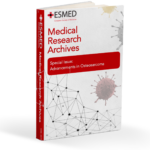Home > Medical Research Archives > Issue 149 > Zinc Deficiency: A Harbinger of Vestibular Dysfunction?

Published in the Medical Research Archives
Apr 2024 Issue
Zinc Deficiency: A Harbinger of Vestibular Dysfunction?
Published on Apr 26, 2024
DOI
Abstract
Background: Role of zinc in the maintenance of redox homeostasis have been explored & is established to have antioxidant effects in the body. Presence of zinc in auditory system & its role in deafness & tinnitus is well established. Zinc supplementation has shown to not only improve tinnitus but also dizziness associated with it which marks the presence of zinc in vestibular system 4. The possible role of zinc in modulating neurotransmission across the glutaminergic synapses in vestibulo cerebellar, vestibulo-occular pathways are established. So, this study aims to assess serum zinc levels in vestibular disorder patients & correlate with severity of the vestibular dysfunction
Methodology: This was Cross sectional comparative study, 40 patients with vestibular disorders & 40 subjects without vestibular dysfunction were included in the study. After thorough history taking, these patients were subjected to Dix Hallpike test, Head Impulse test Romberg test on foam with eyes closed /The Clinical Test of Sensory Interaction and Balance (CTSIB) to confirm vestibular dysfunction. After that, Dizziness handicap inventory (DHI) to assess the severity of the vestibular dysfunction. Serum zinc levels along with other, micronutrients like magnesium, calcium & Serum vitamin B12 & vitamin D were also assessed. Serum zinc levels were compared with age matched controls.
Results: Out of 40 patients, 24 had mild & 16 had moderate scores according to DHI. Serum zinc levels in study group was 60.63±10.10 which was significantly (p<0.005) lower than compared control group 70.50±19.1. Also, Serum zinc levels were corelated with the severity of the vestibular dysfunction, (r=0.89, p<0.00) which shows that more severe the dysfunction lesser the serum zinc levels.
Conclusion: Role of zinc as an antioxidant is well established and deficiency of zinc is linked with the pathogenesis of various diseases. Since evidences suggest involvement of zinc in vestibular system, zinc supplementation in vestibular disorder patients can be considered as add on therapy, which might have a beneficial role with respect to cognitive function as well.
Author info
Author Area
Have an article to submit?
Submission Guidelines
Submit a manuscript
Become a member
